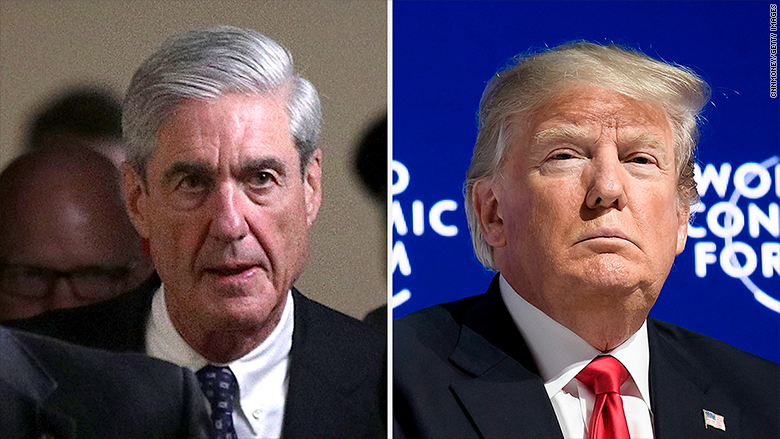
An epic week of Russia-related reporting has collided with a wild conspiracy theory about the FBI and President Trump.
All of the media coverage underscores one thing: Trump's anxiety about Robert Mueller's special counsel investigation.
The revelations have some observers, like Carl Bernstein, concluding that "the president, at all costs, does not want this investigation to go forward."
"He does not want to allow the facts to emerge," Bernstein said on CNN Thursday night after sources told several news outlets that Trump tried to fire Mueller last June.
Republican efforts to undermine Mueller suggest that they, too, perceive his investigation to be a serious threat. The efforts take several forms: Pro-Trump TV hosts sowing doubt about Mueller's integrity, lawmakers blasting the FBI, or other Trump allies changing the subject altogether.
They're all facing down story after story that has revealed Mueller's methodical, secretive approach. Every day, there's at least one new revelation about how many people Mueller has interviewed and how much he has learned about the inner workings of Trumpworld.
Leak by leak, Trump seems to be in a more and more precarious situation. One of the headlines on WashingtonPost.com on Friday said "Trump's handling of the Russia probe has never looked more like a coverup." One of Politico's headlines said "It's now likely Mueller thinks Trump obstructed justice."
All of this amounts to two clear narratives that seem to contradict one another. One narrative: A serious investigation into election interference, obstruction of justice and other possible crimes has been stymied by Trump and his allies.
This impression comes from major newsrooms that are trying to explain what's going on inside the White House and inside Mueller's investigation. The newsrooms are seeking information from sources and corroborating it on a daily basis.
The counter-narrative, advanced by pro-Trump media outlets, is that Trump is the victim of a "deep state" plot to take down his presidency.
The more explosive the news stories from major newsrooms, the more dramatic the counter-narrative from Trump's allies.
The resulting noise from all the news coverage can confound and even turn off viewers.
But the cascade of headlines this week tell a clear story. Here are a few of them:
-- New York Times: "Sessions is questioned as Russia inquiry focuses on obstruction"
-- Axios: "FBI director threatened to resign amid Trump, Sessions pressure"
-- Washington Post: "Mueller seeks to question Trump about Flynn and Comey departures"
-- Washington Post: "Trump asked the acting FBI director how he voted during Oval Office meeting"
-- CNN: "Mueller set to question Bannon on Flynn and Comey"
Then there's the pro-Trump counter-narrative, propped up by numerous conspiracy theories, including two that were heavily promoted this week.
"One revolved around a phrase in a single text message that some Republican lawmakers claimed was evidence of a dangerous secret society in the FBI," Anderson Cooper explained on Thursday's "AC360."
"The other revolved around missing text messages that somehow showed that high-level officials in the FBI were trying to undermine President Trump," Cooper continued. "Today, both parts of this conspiracy theory crumbled spectacularly, as they often do, in the bright light of facts."
Ten minutes after Cooper explained this, The New York Times broke its story about Trump trying to fire Mueller back in June, one month after he was appointed.
The headline: "Trump Ordered Mueller Fired, but Backed Off When White House Counsel Threatened to Quit."
The story was cited on cable news as another piece of evidence that Trump was trying to stop the truth from coming out.
Over on Fox, one of the president's biggest loudest media cheerleaders, Sean Hannity, initially dismissed the Times' scoop.
Hannity, who is in frequent communication with the White House, claimed that none of his sources in the administration could corroborate it. He complained about "phony anonymous sourcing" while guest Gregg Jarrett told viewers that "these are not reliable sources."
But then they had to flip-flop. Hannity found out that Fox News had confirmed the Times' account. He shifted from skepticism to indifference.
"Yeah, maybe Donald Trump wanted to fire the special counsel for conflict," Hannity said. "Does he not have the right to raise those questions?"
On Friday morning, the pro-Trump talk show "Fox & Friends" barely talked about the bombshell story that was dominating other morning shows.
When the Mueller news did come up, it was handled delicately. It was a "typical New York Times" story, said co-host Pete Hegseth, echoing Trump's false claim that it was a "typical" piece of "fake news" by the newspaper.
Co-host Ainsley Earhardt told viewers it was "something we have to tell you about because it is a headline on The New York Times."
"What do you think about that?" Earhardt asked. "Do you even care?"
Tom Kludt contributed reporting.


